
To download the PDF Arabic verion here
To download the English version press here
In Saudi Arabia in 2023, 172 executions were carried out according to data from the Ministry of Interior published by the official news agency. The number of executions increased by 15% compared to the figure announced by the Ministry of Interior in 2022, where 147 sentences were reported, despite the mass execution of 81 individuals in 2022.
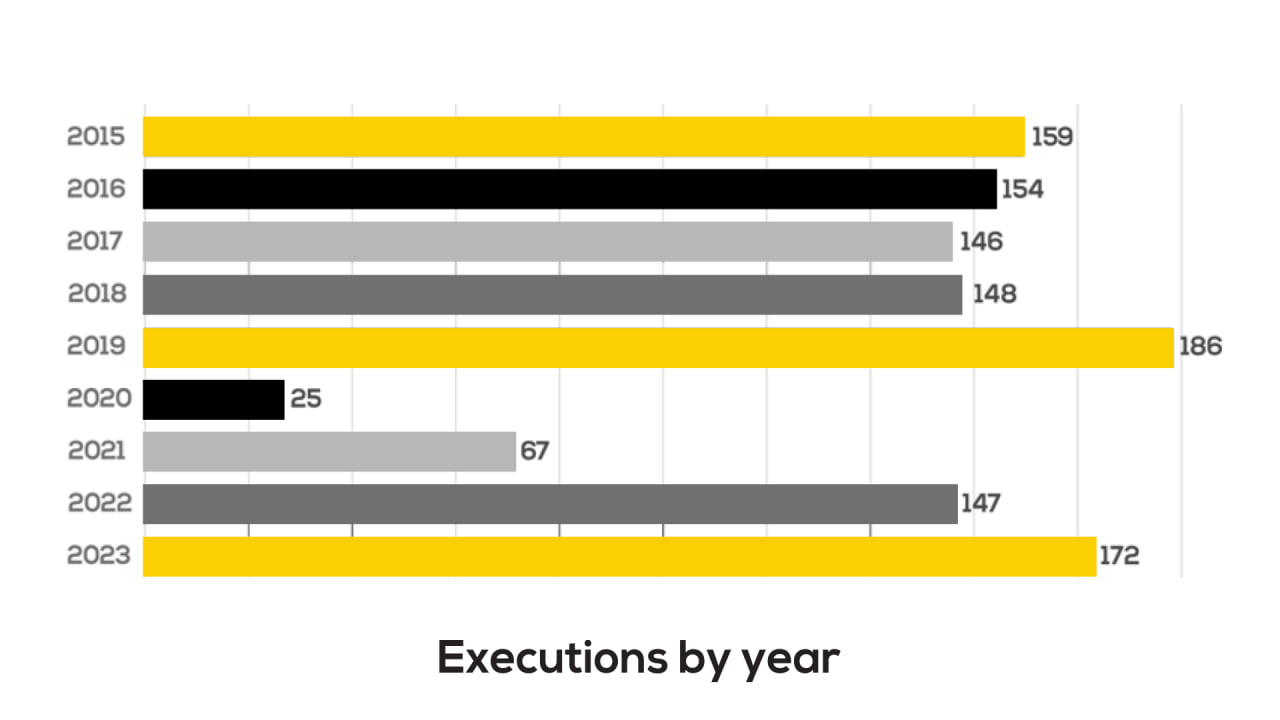
Saudi Arabia carried out the first executions in the third month of the year, resulting in an average monthly execution rate of approximately 17 executions over 10 months. Additionally, the death penalty was executed during the holy month of Ramadan, an unprecedented move as no executions had been reported during this month before.
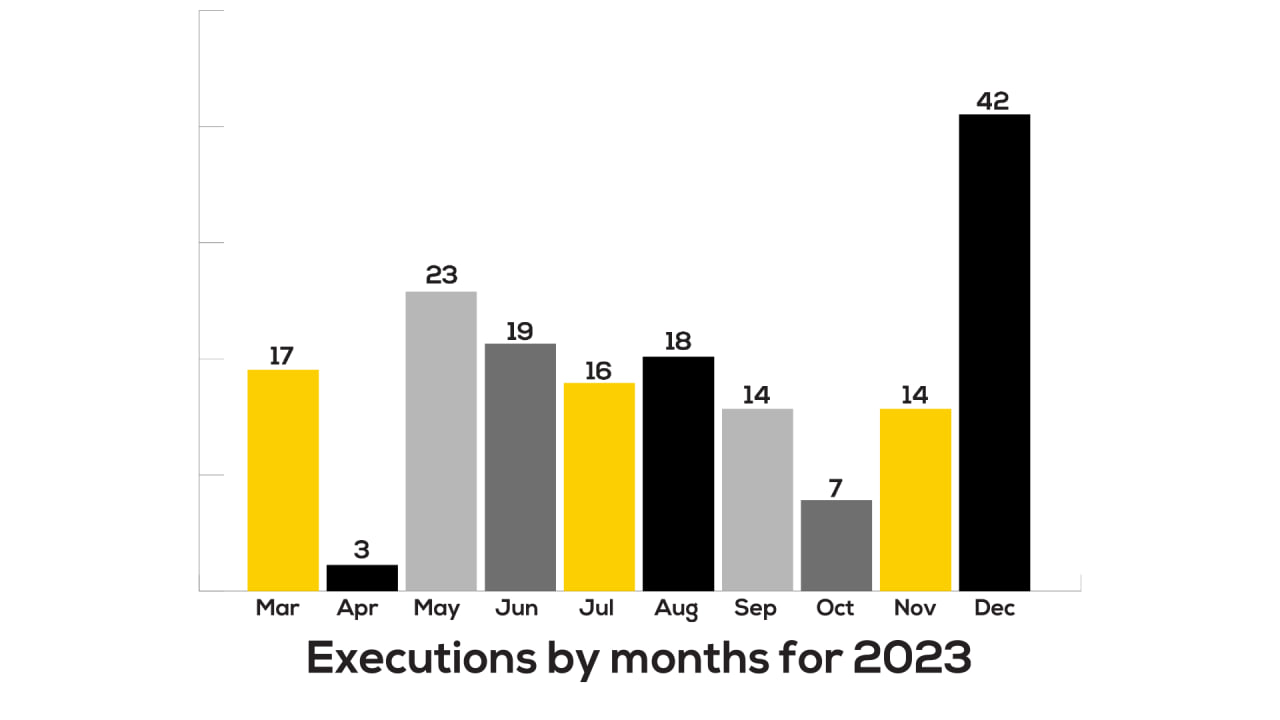
It is not ruled out that the actual number of executions could be higher, as the official Human Rights Commission had stated that the number of executions in 2022 was 29% higher. The commission reported 196 executions, while the official news agency data mentioned 147. This is in addition to information monitored by the European Saudi Organization for Human Rights regarding secret executions.
Individuals:
Saudi Arabia executed death sentences for 134 Saudi nationals, accounting for approximately 78%. The remaining individuals represent various nationalities, including 8 Yemenis, 8 Bangladeshis, 4 Pakistanis, 4 Indians, 2 Bahrainis, 2 Egyptians, 1 Filipino, 1 Nepali, 1 American, 1 displaced person, 2 Sudanese, 1 Ethiopian, 1 Palestinian, 1 Ghanaian, and 1 Jordanian.
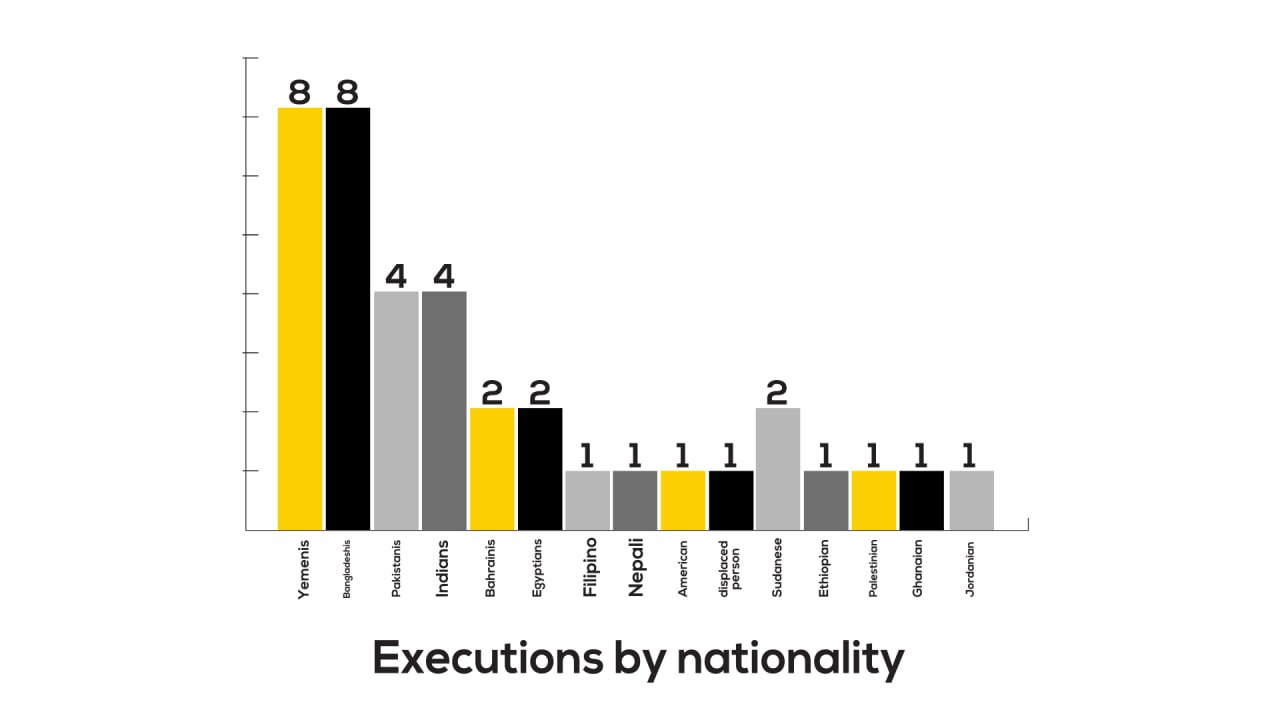
The percentage of females subjected to executions in Saudi Arabia increased, with 6 women executed, constituting approximately 3.4%. This is an increase compared to 0.69% in 2022 and 2021.
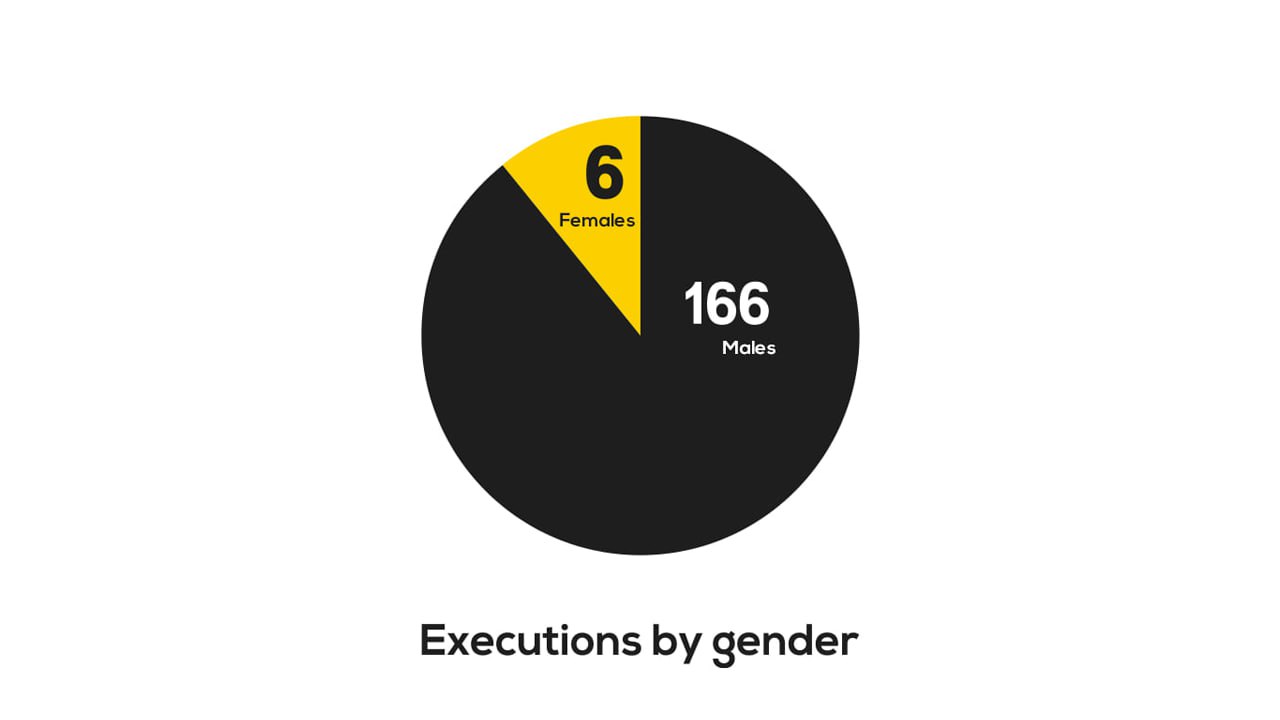
According to official data tracking, 30 of the executed death sentences were issued by the Specialized Criminal Court, notorious for its use in criminalizing activists. However, only 8 of these sentences included charges of intentional murder. Therefore, more than 70% of the death sentences in the Specialized Criminal Court are for charges that are not considered most serious under international law, such as intentional murder. The charges mentioned in the Ministry of Interior's data include Molotov cocktail throwing, sheltering and treating wanted individuals, illegal exit from the country, and weapon possession.
Among those executed were the Bahraini youths, Jaffar Sultan and Sadeq Thamer, for whom the UN Special Rapporteurs had urged the Saudi government to halt the sentences due to the violations they faced during detention and trial. They were not charged with the most serious offenses.
Among the death sentences carried out in crimes not considered the most serious under international law, Saudi Arabia executed two individuals in 2023 on drug-related charges, continuing to violate the moratorium on such executions declared by the Human Rights Commission in January 2020 and breached by Saudi Arabia in November 2022. Among those executed for drug offenses were a Pakistani national and the Jordanian citizen Hussein Abu Al-Khair. The UN Working Group on Arbitrary Detention deemed his arrest and sentencing arbitrary, and several UN rapporteurs had sent messages to the Saudi government regarding his case.
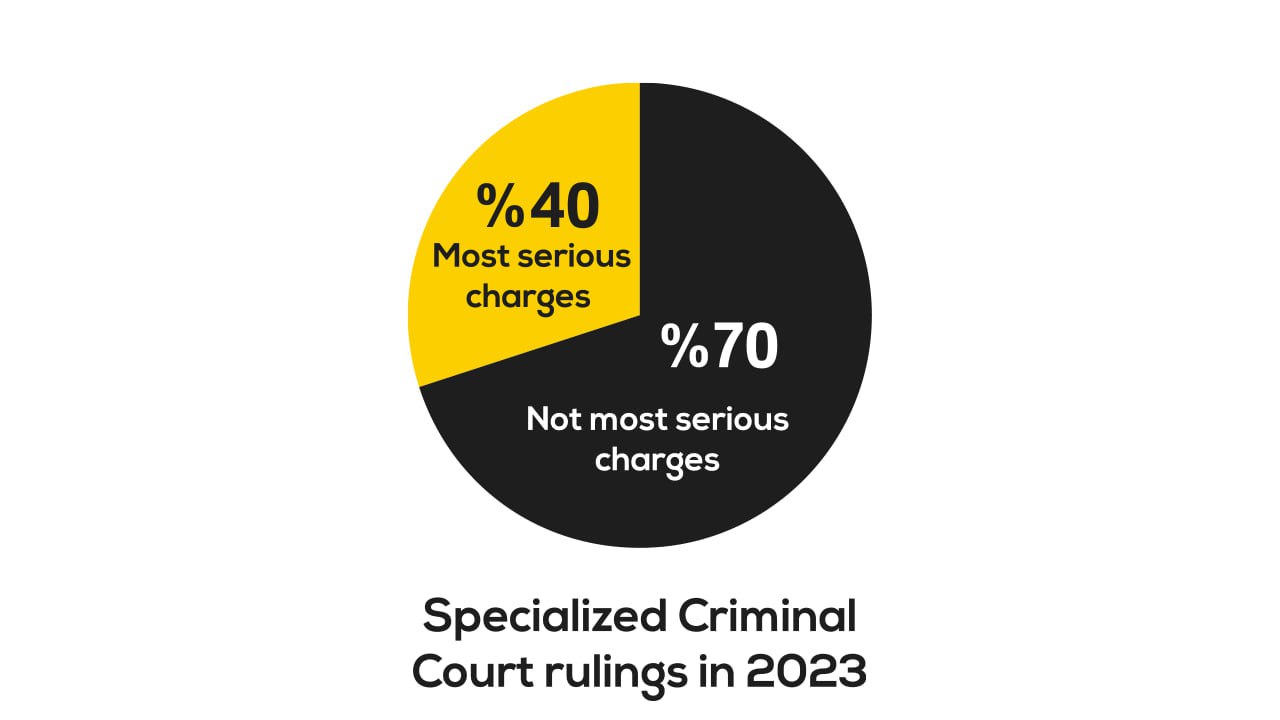
Despite the lack of transparency and the absence of any role for civil society, the monitored cases confirm ongoing violations accompanying executions. These violations include secrecy in execution and depriving families of their right to say goodbye, as Abu Al-Khair was executed without notifying his family. Additionally, there are violations in the trials where judgments are issued after unfair trials involving torture, ill-treatment, and denial of the right to adequate self-defense.
According to the European Saudi Organization's tracking, the government continued its policy of withholding bodies in 2023, with the number reaching at least 146 bodies.
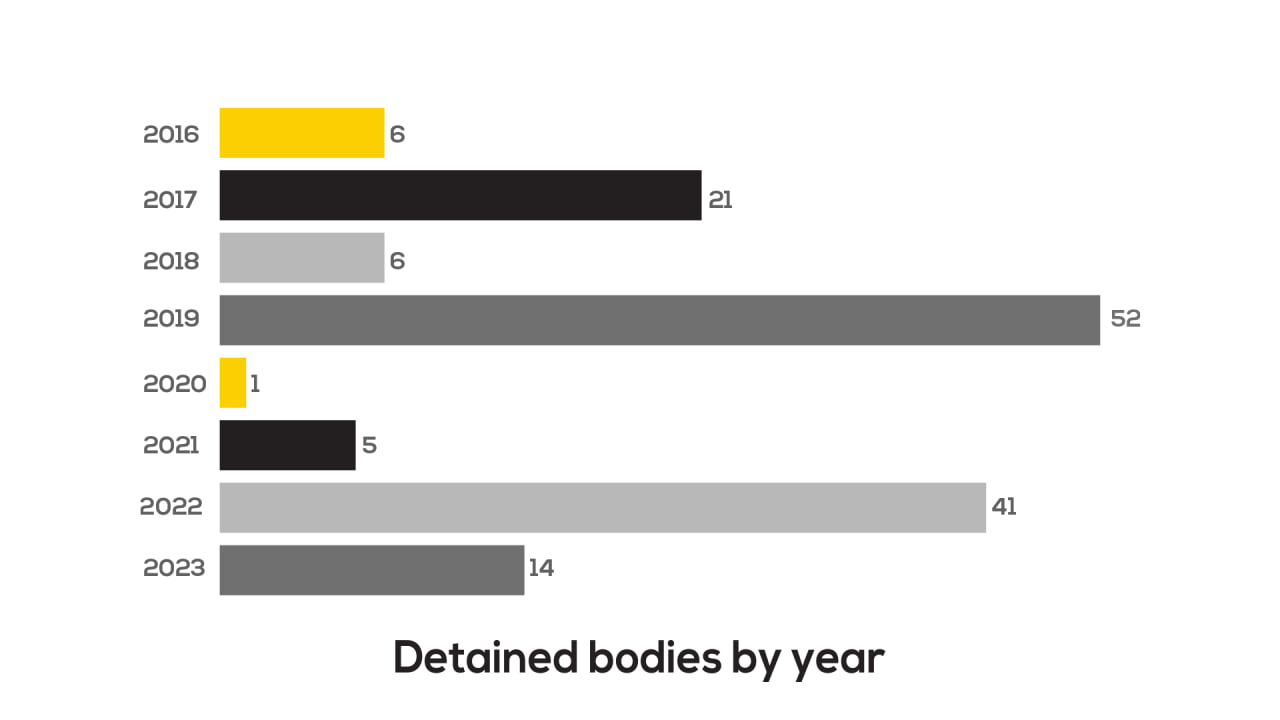
Types of Sentences:
In 2023, the types of death sentences in Saudi Arabia were distributed as follows: 66 were Qisas, 54 were Ta'zir, 50 were Hadd, and 2 were military sentences.
Qisas: These include crimes of physical harm leading to death, such as intentional and unintentional homicide. In these cases, the family of the victim has the right to pardon the perpetrator or accept blood money (Diyah) as compensation. Murder sentences accounted for 38% of the total executions in 2023. Notably, the severity of charges mentioned in the Saudi Ministry of Interior's data, including killing relatives and children, stands out, with these crimes being absent from public discourse. This suggests that they might have occurred years prior, but their execution at high rates in 2023 lacks clarity, compounded by the absence of any role for civil society or investigative journalism, alongside citizen intimidation.
Hadd: These are fixed and specific punishments within Islamic law for specified crimes. There are strict legal and procedural requirements that judges are supposed to adhere to when issuing judgments. Hadd sentences constituted 29% of the total executions in 2023.
Ta'zir: Ta'zir is applied in other crimes considered offenses against the state or society. It is discretionary, with judges deciding the punishment. Ta'zir sentences are not explicitly defined by Islamic law, and Saudi Arabia uses broad and extremist interpretations to apply the death penalty as Ta'zir. Murder sentences as Ta'zir accounted for 31% of the total executions in 2023.
In addition to the three categories, the Ministry of Defense announced in 2023 the execution of two individuals under military sentences. Military sentences are rarely issued and are difficult to trace, characterized by secrecy, raising serious concerns about the violations they may entail.
The European Saudi Organization for Human Rights notes a shift in the distribution of the types of sentences. According to a joint study by the European Saudi Organization for Human Rights and the Reprieve organization covering executions between 2010 and 2021, Ta'zir death sentences constituted 47% of total executions, Qisas formed 40%, and Hadd constituted 13%. Additionally, ESOHR observed that similar charges resulted in different types of sentences, where charges of murder led to Hadd, Qisas, and Ta'zir sentences.
According to the figures, the percentage of discretionary death sentences from the total executions decreased in 2023 compared to the previous 11 years, by approximately 16%. ESOHR highlights that successive official promises, affirming that reducing discretionary death sentences would contribute to an overall reduction in execution numbers, demonstrate the ineffectiveness of these assurances.
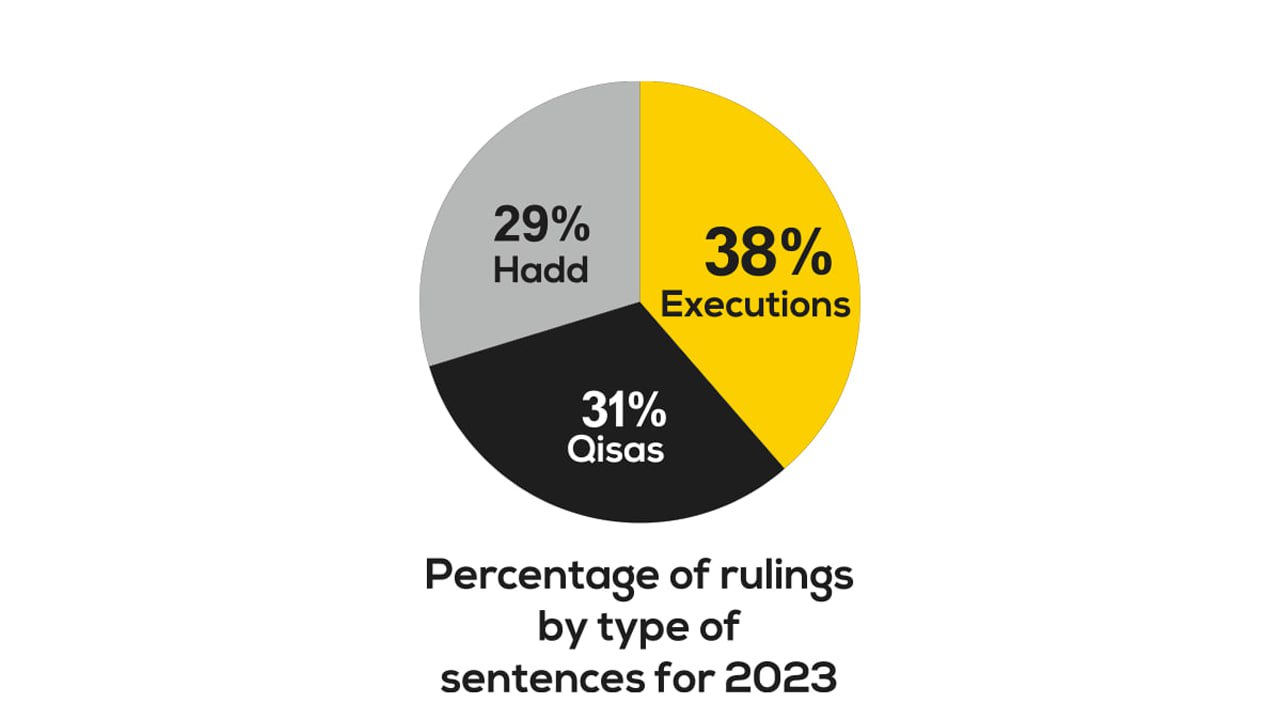
Current Situation:
The European Saudi Organization for Human Rights has only documented 5 cases before the execution of sentences, constituting approximately 2.8% of the total operations carried out in 2023. This underscores the continued lack of transparency in the Saudi government's handling of the death penalty file. This indicates that the number of individuals sentenced to death is unknown.
Nevertheless, ESOHR is currently monitoring 66 cases of individuals facing the risk of execution, including 9 minors. According to the information, 2 of the minors, Abdullah Alderazi and Jalal Al-Labbad, face final sentences, meaning that execution could occur at any moment. Additionally, 7 other minors, including Youssef Al-Munassif, Hassan Zaki Al-Faraj, Jawad Qarir, Mahdi Al-Muhsen, Ali Al-Sabaiti, Ali Al-Mubiuq, and Abdullah Al-Huwaiti, await Supreme Court approval. Despite previous assurances by Saudi Arabia that it had halted all death sentences for minors, it appears adamant about executing these sentences, responding to UN rapporteurs' messages with denial and deception regarding the violations faced by the minors.
In addition to minors, other detainees whose cases ESOHR is monitoring face charges that are not considered the most serious. For instance, the youth Mohammed Al-Faraj faces the death penalty on charges, including insulting the royal family by chanting offensive slogans during protests and gatherings. Similarly, the court sentenced Mohammed Labad to death, even though he surrendered after promises of amnesty, as he did not face serious charges. The specialized court also sentenced young men from the Al-Huwaiti tribe due to their objection to plans to displace them from their regions.
According to ESOHR’s tracking, violations against detainees threatened with execution persist after the issuance of sentences. This prompted Saud Al-Faraj to declare a hunger strike due to the official authorities' refusal to address his complaints.
Additionally, the Public Prosecution is seeking the death penalty for detainees on charges related to expressing opinions, such as Sheikh Hassan Al-Maliki, Salman Al-Ouda, and preacher Awad Al-Qarni.
In 2023, the Specialized Criminal Court sentenced Mohammed Al-Ghamdi to charges related to expressing opinions and using social media in a trial that did not exceed one month.
The continuation of issuing and approving death sentences confirms that the promises made in recent years regarding the death penalty fall within the framework of official propaganda and do not reflect the reality of implementing and ceasing its political use. This reality was underscored by Crown Prince Mohammed bin Salman in a television interview in September 2023. He confirmed the issuance of a verdict related to Al-Ghamdi's tweets. When asked about the possibility of his execution, he expressed the wish that the judge in the new judicial phase would be more experienced.
Bin Salman's confirmation of issuing death sentences for tweeting exposes official hypocrisy in recent years, where official statements repeatedly claimed that death sentences are only issued for the most serious crimes. It also undermines all the promises he made, asserting that death sentences are now limited to cases involving murder only.
The European Saudi Organization for Human Rights views 2023 as a year that demonstrated Saudi Arabia's inconsistency in using the death penalty. Besides the unexplained shift in the types of executed sentences, the implementation of death sentences for drug-related charges, and the disregard for international legal opinions, the high numbers indicate Saudi Arabia's determination to use the death penalty without restraint.
ESOHR believes that the sentences and approvals, along with the statements of the Crown Prince, undermine previous expectations for the execution of promises made by various entities. It emphasizes that the statements are part of propaganda and promotion of an unrealistic image of the official handling of human rights in Saudi Arabia. ESOHR also stresses that the numbers and data heighten concerns for the lives of those currently threatened with execution, including minors.
